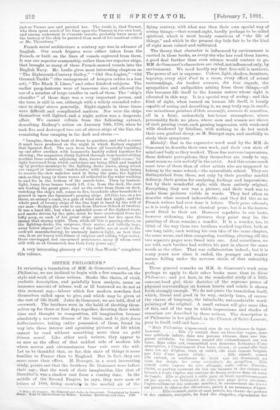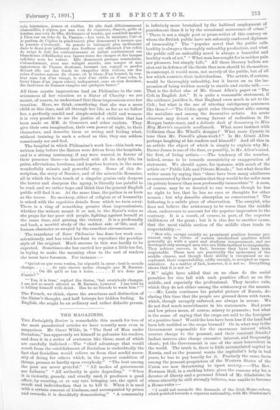SISTER PHILOMILNE.* Ix reviewing a translation of MM. de Goncourt's
novel, Sour Philomi:ne, we are inclined to begin with a few remarks on the style and work of these writers. Books like theirs, of vivid, realistic description, and painfully keen analysis, mean an immense amount of labour, well or ill bestowed we do not at this moment say,—labour which few modern novelists feel themselves called upon to give, and which may be given at the cost of life itself. Jules de Goncourt, we are told, died of overwork. The brothers were in the habit of shutting them- selves up for three or four days together, devoting their whole time and thought to composition, till imagination became absolutely a nervous disease of the brain, and la forte ,flovre hallucinatoire, taking entire possession of them, found its way into these intense and agonising pictures of life which cannot be read without something more than un petit frisson moral. Like other such writers, they appear to us now as the effect of that saddest side of modern life where nerves and circumstances bear rule over the will. Let us be thankful that, so far, this state of things is more familiar to France than to England. But in fact, they are more cause than effect. M. Bourget, in a most interesting study, points out that the brothers De Goncourt were before their age; that the work of their imagination, like that of Stendhal's, was a shadow cast from a coming time. In the middle of the Second Empire, he says, they were men of letters of 1880, living mental* in the morbid air of the Philoake, By Edmond autl Jule; tle Goucom.t. Trauslatea by Laura, Baser. With 70 Illustrations by Bielor. Landon: Rontleilige and giQUB, 1i90, dying century, with what was then their own special way of seeing things,—that second-sight, hardly perhaps to be called spiritual, which is most keenly conscious of " the life of things," and which in the present day bids fair to be the kind of sight most valued and cultivated.
The theory that character is influenced by environment is carried in these books, as every one who has read them knows, a good deal further than oven science would venture to go. MM. de Goncourt's characters are ruled, not influenced only, by environment. We need hardly say that free-will is nowhere, The power of art is supreme. Colour, light, shadow, furniture, tapestry, every objet d'art in a room, every effect of actual surroundings, des tenk.es nuances, dee tons coquets, the sympathies and antipathies arising from these things,—all this becomes life itself to- the human nature whose sight is educated in this way. It is a special way of seeing : and this kind of sight, when turned on human life itself, is keenly capable of seeing and describing it, we may truly say, in small ; tine minutieuse peinture d'etats successifs, nuances de sensation, all in a faint, melancholy hot-house atmosphere, where personality finds no place, where men and women are slaves of each passing event, each passing impression, with weakened wills shadowed by fatalism, with nothing to do but watch their own gradual decay, as M. 13ourget says, and morbidly to study their symptoms.
Malady : that is the expressive word used by the MM. de Goncourt to describe their own work, and their own state df mind and body as they worked. These fine nervous impressions, these delicate perceptiOns, they themselves are ready to say, must mean un coin maladif in the artist. And this seems much more true of them than of other artists who are supposed to belong to the same school,—the naturalistic school. They are distinguished from these, not only by their peculiar morbid delicacy, their genius for analysing feelings and impressions, but by their wonderful style, with them entirely original. Everything they saw was a picture, and their work was to make these pictures visible in words. They had often to describe what seemed indescribable, and they did. this as no French writers had ever done it before. Their prose vibrante, as it is truly called, is not classical prose, but it is the instru- ment fitted to their art. However repulsive to our taste, however sickening, the pictures they paint may he, the painting of them remains a wonder. It is a wonder, too, to think of the way these two brothers worked together, both at one long table, each writing his own idea of the same chapter, the same scene, and then comparing, touching, altering, till the two separate pages were fused into one. And sometimes, we are told, each brother had written his part in almost the same words as the other. That was collaboration indeed; but it is many years now since it ended, the 'younger and weaker nature failing under the nervous strain of that unhealthy work.
These general remarks on MM. de Goncourt's work seem perhaps to apply to their other books more than to Sam?
Philonx;:ne ; and yet here, in the wonderful study of a little convent-bred girl, their doctrine of the supreme power of physical surroundings on human hearts and minds is shown forth strongly enough. We do not quote the translation itself, which, literal and good in its way, entirely loses, of course the charm of language, the inimitable, untranslatable word- painting of the original. A small extract will give some idea of this, and of the way in which impressions and shades of sensation are described by these writers. The description is of Philomene in her girlhood, in the Church of Saint-Laurent, poor in itself, cold and bare :— " Mais Philonaime n'apercevait rien de ces trietesses de Saint- Laurent Elle s'y sentait dans un bion-itre vague, clans une qui6tude infinie, dans une paresse reveuse, dans une Ian- guenr satisfaite. Le charme auquel elle s'abandonnait sur son bane, dans cette net, ressemblait aux douceurs fiottantes d'une atmosphh,e, Penervement d'un beau climat ; et quand elle (that clans cot air d'6glise, frais et subtil, elle (twit comma baign6e par lair d'une patrie id6ale Elle aimait, quand elle entrait, ce sentiment de froid quo lui donnaient au bout des doigts lee crins cristallisk du goupillon. Elle aimait cat° vapour de cure allmae; cat() odour d'encens 6teint, co parfum mourant do feu des baumes at des ciorges qui laissait a touto une senteur do Hoare s6c1Aes dans en recta de funnle. Elle so plai %tit it ootto /mix au bruit myst6rieeseraent un pas tunorti, un fr&loment do robe, uno page ilifon reteuree, l'agenouillement des oraisons muettes, le susurrement des Nrvres qui prient, le silence des 616vations, pared it un rnurmuro . . . Elle 4coutait, ramie at sans pensk, les chants des prAtree et des enfants, ttuxquels, du fond des chapelles, r5pentlaient des
voix lointaines, jeunes et vieilles. Et elle 6tait dalioieusement chatouill4e, e vepres, par une voix do chantour, Mance*, grAle et tendue, nne voix de tAte, d6chirante et tendre, qui semblait mentor e Dieu our un echo do la Passion.—Les voix, la musique, fair of le parfum de Peglise is penetraient plus doucement k mesure quo la journ6e s'avancait. Sa pensee so balancsAt plus mollement dane le demi-jour pelissant aux fenotres qui eflleurait d'un reflet de neige to toit des confessionnaux et melait confustiment ses blancheurs d6faillantes aux lueurs roses des cierges et des lampes refiet6es sous les %rates. Elle demeurait presque somnolente, s'abandonnant, avec une volupt6 secrete, aux songes et aux apparences de naive doutouse, laissant son regard so perdre dement elle our des fonds de chapelles d6je voilees, sur dos coins d'ombre autour du chem., ob: le blanc d'un bonnet, is cou- leur sans ton d'un visage, lo noir d'un chide ou d'une robe, le liser6 blanc d'un jupon relev6, indiquaient, sans en rien dessiner, des fantomes de femmes rangees sur quelques banes."
All these mystic impressions lead on Philomene to the con- sciousness of her vocation as a Sister of Charity : we are meant, of course, to understand that these impressions were her vocation. Here, we think, considering that she was a mere child at this time, and all through her life, as far as we follow her, a perfectly candid and simple-minded child and woman, it is very possible to see the justice of a criticism that has been made on MM. de Goncourt and other realists. They give their own imagination, their own power of sight, to their characters, and describe them as seeing and feeling what, without training in such a school as this, they can seldom consciously see and feel.
The hospital in which Philomene's work lies—this book was written long before the Sisters were driven from the hospitals, and is a strong testimony, if any were wanted, in favour of- their presence there—is described with all its daily life, its pains, alleviations, heroisms, and hopeless horrors, in the same wonderfully minute and powerful way. Some of this de- scription, the story of Barnier, and of the miserable Romaine, all in which the keen touch of a singular genius only deepens the horror and sharpens the agony, is literally too painful to be read, and we rather hope and think that the general English public will find it so. At the same time, the pathos is as keen as the terror. No mockery, either of religion or of humanity, is mixed with the repulsive details from which we turn away. There is a ring of something greater than impressionism, whether the writers meant it or not, in the Sister's voice as she prays for her poor sick people, fighting against herself at the same time, and gaining the victory. It is a profoundly sad book, a morbid study of the saddest side of -life, and of human character as swayed by the cruellest circumstance.
The translator of Sour Philovane has done her work con- scientiously, and has tried her .best to reproduce the peculiar style of the original. Much success in this was hardly to be expected. Sometimes she has carried her pains a little too far, in trying to make the meaning clear to the sort of readers she must have foreseen. For instance :— " Qu'est-ce que vous voulez, lui ripondit la scour; tout le monde change Jo Buis encore moires change que M. Barnier. On dit qu'il so tue k boire Il n'a done pas d'amis P " " 'Yes, it is true,' replied the Sister, but everybody changes. I am not so much altered as M. Barnier, however. I am told he is killing himself with drink. Has he no friends to warn him ? "
The French, we think, shows the sweetness and distinction of the Sister's thought, and half betrays her hidden feeling. In English, she might be an ordinary and rather didactic person.











































 Previous page
Previous page